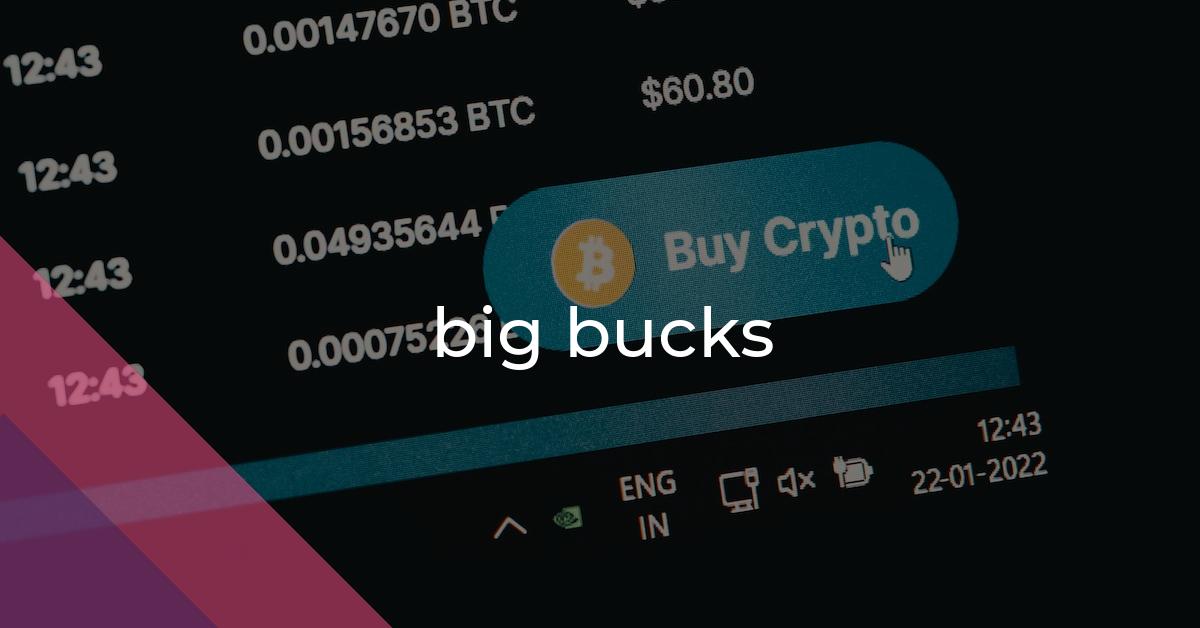big bucks: Idiom Meaning and Origin
What does ‘big bucks’ mean?
The idiom "big bucks" means a large amount of money or a substantial sum of money. It is often used to describe a significant or impressive financial reward or earning.

Idiom Explorer
The idiom "pretty penny" means a significant or large amount of money. It is often used to emphasize the high cost or value of something.
The idiom "great deal" means a large amount or quantity of something. It is used to indicate that there is a significant or considerable extent or degree of something.
The idiom "buck for" means to strive for or actively seek a particular position, promotion, or opportunity.
Break the bank means to spend a lot of money or to cause financial hardship by spending excessively.
The idiom "bread and butter" means a person's main source of income or the basic necessities of life.
The idiom "big talk" means to make boastful or exaggerated claims or promises, often without the intention or ability to follow through on them.
The idiom "big shot" refers to someone who is powerful, influential, or successful. It is often used to describe someone who has achieved a high status in a particular field or industry.
The idiom "big ole" is used to describe something that is very large or significant, often in a casual or colloquial manner.
The idiom "big old" is used to emphasize the size or importance of something or someone. It is often used informally to add emphasis or exaggeration in speech or writing.
Deciphering Wealth Slang
The idiom "big bucks" is a commonly used phrase in American English that refers to a large amount of money. It is an informal expression that has become part of everyday language, conveying the idea of wealth or financial success. The exact source and etymology of this idiom are not definitively known.
One theory suggests that the term "big bucks" originated from hunting culture, specifically in reference to the pursuit of large game animals like deer or bucks. The word "bucks" in this context refers to male deer, known for their impressive antlers. The association of big bucks with a successful hunting endeavor could then have been applied metaphorically to the accumulation of wealth.
Another theory suggests that the idiom may have emerged from the world of professional poker or gambling. In poker, players use chips for betting, and larger denominations of chips are often called "bucks." The use of "big bucks" in this context could have signaled a substantial amount of money being wagered or won in a game, eventually extending to general references to large sums of money.
While these theories provide some possible explanations, the true origin of the idiom "big bucks" remains uncertain. Additionally, it is important to note that idioms often evolve and change over time, with their meaning becoming detached from their original context.
In contemporary usage, the idiom "big bucks" is often used when discussing financial success or significant amounts of money. It can be found in literature, movies, and everyday conversation. Its widespread usage and familiarity make it a recognizable phrase in American culture.
The meaning of "big bucks" is easy to understand for most English speakers. It conveys the idea of substantial wealth or a significant amount of money. The word "big" emphasizes the size or magnitude of the monetary sum, while "bucks" serves as a colloquial synonym for money. Together, the phrase represents a shorthand way of expressing the concept of financial abundance.
As with many idioms, the meaning and usage of "big bucks" can vary depending on the context. It can be used literally to describe a large sum of money, such as a million dollars or more. It can also be used figuratively to convey the idea of any substantial amount, relative to a specific situation or individual's circumstances.
The idiom "big bucks" is deeply ingrained in American vernacular, commonly used to describe significant amounts of money. While its exact origin remains elusive, its use is likely to persist, continually evoking notions of wealth and financial success.
Now, let's explore some related idioms that are associated with the idiom "big bucks."
The idiom "pretty penny" is used to describe something that is expensive or costs a significant amount of money. It can be used interchangeably with "big bucks" in contexts where the emphasis is on the high cost or value of something.
The phrase "great deal" is often used to describe a situation or opportunity that offers a lot of value or benefits for the amount of money being spent or invested. It can be related to "big bucks" as it implies that a substantial amount of money is involved, but the focus is on the advantageous nature of the transaction.
"big spender" is a term used to describe a person who consistently spends large amounts of money, often on luxury items or experiences. This idiom is closely related to "big bucks" as it highlights individuals who have the means to spend significant sums of money.
"a good deal" is an idiomatic expression that conveys the idea of something being advantageous or beneficial, usually in terms of value or price. While it may not directly refer to "big bucks," it can be used in contexts where significant amounts of money are involved, and the emphasis is on the favorable nature of the transaction.
These idioms, along with "big bucks," contribute to the language used to discuss wealth and financial matters. Their usage adds clarity, variety, and depth to conversations surrounding money and financial success.
Example usage
Examples of how the idiom big bucks can be used in a sentence:
- He landed a high-paying job and started making big bucks.
- The lottery winner became an overnight millionaire and suddenly had big bucks to spend.
- The company's successful marketing campaign brought in big bucks for the business.
More "Finance" idioms



